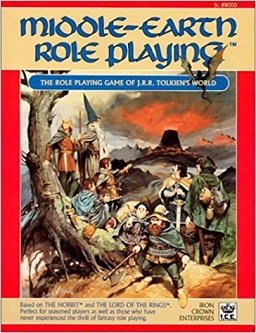Modular: My Favorite “Do It Yourself” Products for Roleplaying Games
 Those who know me a little more than as an infrequent contributor to Black Gate Magazine might be aware that I once aspired to be a writer of fantasy stories and novels, even publishing (for a short time but longer than average life expectancy) a small press magazine with co-editor and lifelong friend Nick Ozment. A few years into my forties, however, roleplaying games have utterly subsumed my creative life. I’m currently gamemastering four games: my home game, the very first roleplaying game I ever ran in my young life, Middle-Earth Role Playing (MERP); another MERP game, this one using full Rolemaster rules (2nd edition), via play-by-post (PbP) in a G+ community; and two Modiphius Conan 2d20 games, one via PbP in a G+ community and one (same format) in a Facebook group. This last one is being conducted with Bob Byrne and Martin and Xander Page and is the subject of a new Modular series helmed by Mr. Byrne. In preparing my observations on Modiphius’s licensed Conan property, I have been thinking deeply about various… I suppose I shall call them “styles” of play. Using what I consider two fairly representative rules sets of what I mean by play “styles,” I have done a pretty extensive breakdown here. I expect I also shall have occasion to write about different styles of play in the midst of my experience with the 2d20 playtest. Right now, though, I want to talk about what can be termed the OSR (Old School Revival) — perhaps more accurately referred to as DIY (Do It Yourself) — resources that I most appreciate and are the most often used in my MERP games. Specifically, these resources help me come up with content and develop my fantasy world.
Those who know me a little more than as an infrequent contributor to Black Gate Magazine might be aware that I once aspired to be a writer of fantasy stories and novels, even publishing (for a short time but longer than average life expectancy) a small press magazine with co-editor and lifelong friend Nick Ozment. A few years into my forties, however, roleplaying games have utterly subsumed my creative life. I’m currently gamemastering four games: my home game, the very first roleplaying game I ever ran in my young life, Middle-Earth Role Playing (MERP); another MERP game, this one using full Rolemaster rules (2nd edition), via play-by-post (PbP) in a G+ community; and two Modiphius Conan 2d20 games, one via PbP in a G+ community and one (same format) in a Facebook group. This last one is being conducted with Bob Byrne and Martin and Xander Page and is the subject of a new Modular series helmed by Mr. Byrne. In preparing my observations on Modiphius’s licensed Conan property, I have been thinking deeply about various… I suppose I shall call them “styles” of play. Using what I consider two fairly representative rules sets of what I mean by play “styles,” I have done a pretty extensive breakdown here. I expect I also shall have occasion to write about different styles of play in the midst of my experience with the 2d20 playtest. Right now, though, I want to talk about what can be termed the OSR (Old School Revival) — perhaps more accurately referred to as DIY (Do It Yourself) — resources that I most appreciate and are the most often used in my MERP games. Specifically, these resources help me come up with content and develop my fantasy world.
There are a number of “adventure generators” — perhaps more accurately described as “idea machines” — out there. I’m sure all of them are fantastic. You can download one for free from Astonishing Swordsmen & Sorcerers of Hyperborea at its website Hyperborea.tv. Nearly all of the products and producers that I’m going to mention in this article offer one. Even Conan 2d20 has one, though the focus of that generator, due to the nature of play that Conan encourages, is a bit different, and I expect I will analyze this at length when I get to that portion of the official playtest series. These “adventure generators” almost certainly are evolved from the “story creators” that Ozment once told me that the early pulp writers used, sometimes flicking spinners rather than throwing dice. Hey, modern GMs are under almost the same kind of pressure as those pulp writers were, though instead of needing to churn out words for pennies to put meat on the table they need to come up with an idea quick, tonight, before the players come over expecting to be wowed and entertained. Pre-made modules can do the same thing, of course, but they have to be studied first, details have to be remembered, and sometimes they just don’t work with the ongoing campaign in the way that a few randomly generated elements can result in truly inspired serendipity. All of the products I’m about to profile I own and use in PDF.